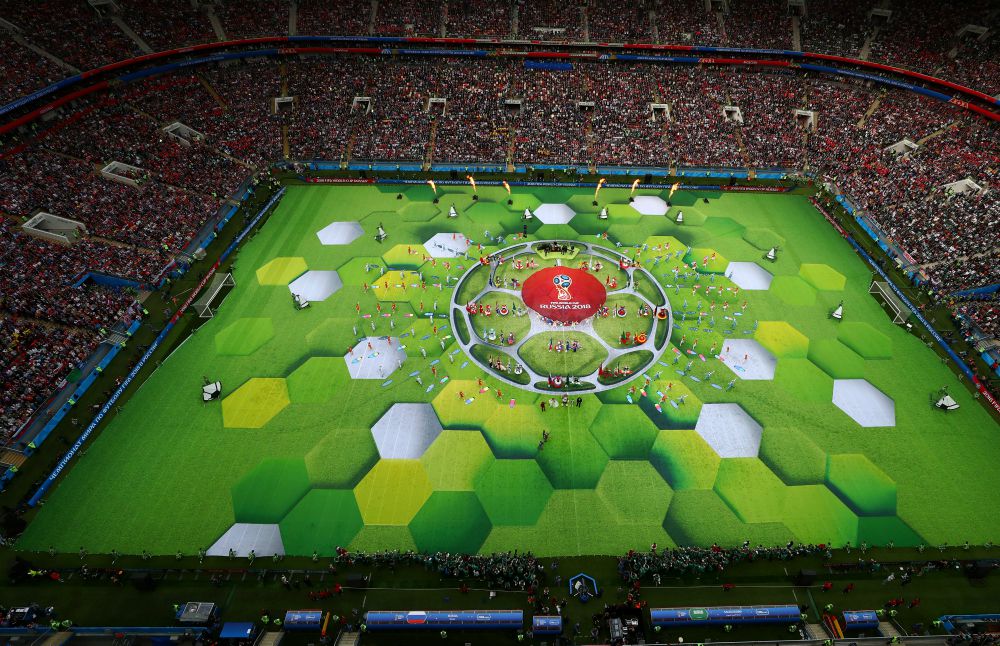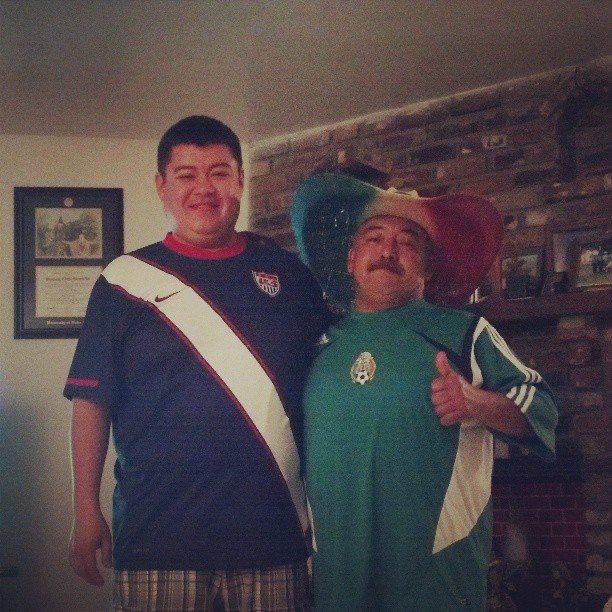
Aerial view of Moscow's Luzhniki Stadium during the opening ceremony of the 2018 FIFA World Cup June 14 (CNS/Reuters/Carl Recine)
A few weeks ago, Enrique Gonzalez and thousands of other Mexican-Americans in San Diego, California, faced a dilemma: Do you protest immigrant family separation at the border as part of a huge march to an Immigration and Customs Enforcement office downtown? Or do you watch the Mexico versus South Korea World Cup match?
"A tough choice indeed for the Mexican community," Enrique, my wife's cousin, told me in an email. "The question was not, 'How do I accomplish both? But, which do I sacrifice this day?' " Enrique's wife Melissa marched, while he stayed home and watched the game with their two young daughters, sending her text message updates. "We worked as a team, haha," he wrote. (Mexico won the match, 2-1, and ultimately advanced out of the group stage of the tournament before losing to Brazil in the Round of 16.)
That day's confluence of big events in Southern California pointed to a question I've been wondering about this summer: What is it like for Mexican-Americans to root for the Mexican men's national soccer team during this era of pervasive anti-immigrant sentiment here?
I connected via email with six young adult Mexican-Americans, all in their 20s and 30s, to ask them about their experiences during the World Cup. All six were born in the United States, and five are the children or grandchildren of immigrants from Mexico. Their level of soccer fandom varies, but they all consider themselves supporters of "El Tri" — the national team's nickname, derived from the three-color Mexican flag. They were gracious enough to share candid, insightful reflections with me.
Rooting for El Tri in the USA: Family traditions and cultural connections
"You know how people went to football games in college like it was going to Mass? But they still didn't know what the parts of the Mass meant?" This is how Desirée Garcia, a fellow University of Notre Dame alum thinking back on our college experience, described her El Tri fandom: deep-seated, communal and familial, ritualistic, and not all that familiar with particular facts and figures.
"I used to have a Mexico jersey," she said. "One World Cup (when I lived in Washington, D.C.), I ran laps around my block alone every time they scored. As a kid, this is how we learned the Mexican national anthem." She remembers her grandmother in Mexico mailing her promotional World Cup iron-on patches put out by bread company Bimbo during the 1994 tournament. "My parents probably still have the terrible T-shirt I made where I ironed on ALL the patches."
For Anthony Paz, whose father's Mexican family has been in the U.S. for over a century, liking the sport of soccer itself felt countercultural growing up in a country that prefers other sports. Anthony's dad instilled a love of soccer in his children as "what felt like a distant connection to our Chicano roots," he said. Outwardly, Anthony rooted for the U.S. men's national team over El Tri. "But when the U.S. was inevitably knocked out, I felt a pull to support Mexico," he said. "This has been a kind of intentional way of asserting and claiming my family history."

José Alfredo Gonzalez, left, with his father, also José, during a Mexico-USA soccer game (Provided photo)
Does this World Cup feel different than other World Cups in the past, given the political backdrop?
José Alfredo Gonzalez (no relation to Enrique) told me he is unique in his family in that he roots for the U.S. men's national team over Mexico when the two countries play. But this matchup wasn't possible in this year's World Cup, as the U.S. didn't even make the tournament's field of 32. He remembers feeling conflicted when the Americans lost their last qualifying match, knocking them out of the World Cup months before it started.
"A lot of people saw it as karma and vindication due to the actions of the current administration," José said, referring to President Donald Trump's border wall proposal, travel ban, ending of Deferred Action for Childhood Arrivals (DACA) protections for "dreamers," (people brought to the U.S. as children without documentation), and the "zero-tolerance" detainment of families from Central America who arrive here seeking asylum, among other policies.
"In the past, I wouldn't have had any hesitation rooting for the U.S," he said. "This time, what better way to disassociate yourself from the current administration than by rooting against their representatives on the fútbol field? Nothing against the players, but for a lot of people, they see the USA and think Trump."
Antonio De Loera-Brust, who wrote a fabulous piece about the World Cup for America magazine, said this time around hasn't felt all that different from previous tournaments.
"It's kind of comforting to have a way to be proudly and loudly Mexican that isn't immediately politicized," he said. "A return to normalcy in a way."
Watching most of the games from New York after growing up in California, Antonio has enjoyed the world's biggest sporting event in such a multiethnic place. "You see people wearing their jerseys; you can find a little ethnic enclave for every team playing. I kind of like that lots of Americans are just not interested; it gives us the feeling of a secret code."
Marcella Marquez, a recent college graduate, felt a little more tension.
"I was a bit nervous about the World Cup beginning because I know that Mexico fans are very passionate and we love to show our support in very visible ways. I am afraid that people will hurt Mexico fans when they are in the midst of a celebration," she said, noting the rise in anti-immigrant rhetoric and even bullying and assault. "Luckily, so far the only aggressions towards Mexico fans that I have seen have been through online comments on Facebook." She also mentioned seeing positive comments from Anglo Americans, cheering Mexico on.
Desirée was more direct. Does this World Cup feel different? "Of course it [expletive] does." She wrote about her anger and anxiousness around the end of the DACA program and the rise in deportations.
Advertisement
Do you feel any uniting forces at work during this World Cup? Or is the division we're experiencing now just too strong to overcome with sports?
José describes attending a "Keep Families Together" march in Los Angeles recently and how seeing flags raised from dozens of different countries reminded him of the global unity of the World Cup. Antonio told the story of a Moroccan cab driver in New York giving him a discount after they shared a fun conversation about the tournament.
But Anthony and Enrique aren't sure whether soccer can be a source of unity here. Both described an anti-soccer sentiment that goes along with xenophobia — it's just not an "American sport."
But before Mexico's loss to Brazil, Anthony found himself hoping the team's successes might trickle over into the national political conversation.
"I can't help but hope that El Tri go further than ever as a kind of way of sticking it to those who have painted Mexicans so negatively in recent years. Unbecoming desires for vengeance aside, I can also only imagine the morale boost that Mexican-Americans and would experience with a World Cup victory in the face of anti-immigrant and implicitly anti-Mexican politics dominating Republican priorities lately," he said. "This is what I really hope for in every Mexico win, something for Mexicans and Mexican-Americans to point to and say, 'Look, our people are as good as anyone at this game. We are not bringing drugs or crime. We are not rapists. We're damn good soccer players and so much more.' "
Unfortunately, despite two convincing wins in the first days of the World Cup, including one over defending champion Germany, Mexico's bid to win the championship must now wait at least four more years.
Antonio wrote me one last email in the midst of the post-match disappointment.
"All I'll say is the last time Mexico got past the Round of 16 was 1986. That was also the last time the U.S. gave undocumented people a path to citizenship," he said, referring to Simpson-Mazzoli Act passed by Congress and signed by President Ronald Reagan. "It has been too long since either an amnesty or a quarterfinal game with Mexico."
[Mike Jordan Laskey is the director of Life & Justice Ministries for the Diocese of Camden, New Jersey. He blogs for the Camden Diocese at camdenlifejustice.wordpress.com.]
Sign up for email updates for future articles in the series, The Gospel of Sports.







